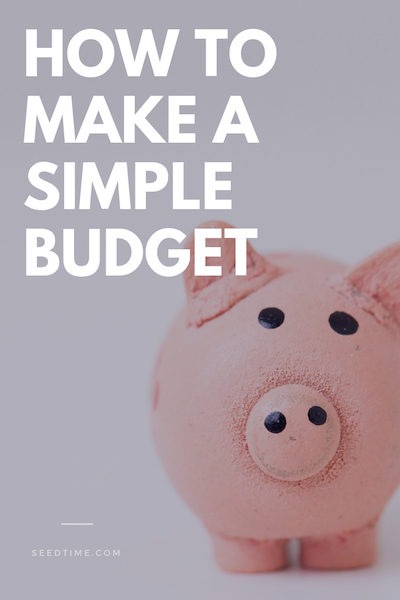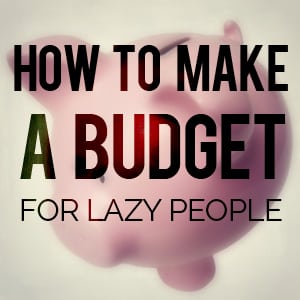
Expenses > Income = Bad
& Expenses < Income = Good
And honestly, as simple as it sounds, that is the key to wealth. Anyone, and I mean anyone, who IS wealthy (I emphasize IS because I am not talking about people who appear to be wealthy, but who are actually in debt up to their eyeballs) spends LESS money than they earn. AKA – their expenses are less than their income.
The great news about this is that anyone can do this – no matter what their income level. If you can do it on a small income, then you can do it on a large income. If you can’t do it on a small income, then you won’t be able to do it on a large one either. Trust me!
If you don’t believe me, just ask all of the lottery winners who went bankrupt within years of winning millions of dollars.
Back to making our budget…
Regardless of how your expenses and income compare right now – get excited, because you can easily change it!! If it is bad, you can make it so much better!! If it is good, you can still make it even better!! I will show you how later, but for now…How to make a budget!
 Did you calculate what your monthly expenses and income were? Were your expenses less than your income? If so, you are a rare breed who is in great shape, so just sit tight for a minute.
For everyone else, whose expenses exceeded your income – you are not alone. You actually have a lot of company. The problem is that it isn’t good company! Most of our debt-ridden society is in the same boat, but you are one of the bold ones who is jumping out of the debt boat!!
So, if your income is $1000 and your expenses are $1200, that means you spend an extra $200 each month that YOU DON’T HAVE!! What your job is now is to find out what you can get rid of or quit buying each month to save that $200. If you have no idea where to start you can check out these money saving tips.
I know, I know – this is the part that hurts. Just like pruning a bush – cutting back hurts, but ultimately you are going to yield so much MORE fruit because of it!!
The goal here is to get your expenses and income to AT LEAST be equal. Once that is accomplished, we can work on eliminating wasteful spending or cut other costs to bring the expenses below the income.
Now that you have calculated what your monthly income and expenses are, we can start designing our budget. We will first discuss the less effective, but easier method for budgeting…
Did you calculate what your monthly expenses and income were? Were your expenses less than your income? If so, you are a rare breed who is in great shape, so just sit tight for a minute.
For everyone else, whose expenses exceeded your income – you are not alone. You actually have a lot of company. The problem is that it isn’t good company! Most of our debt-ridden society is in the same boat, but you are one of the bold ones who is jumping out of the debt boat!!
So, if your income is $1000 and your expenses are $1200, that means you spend an extra $200 each month that YOU DON’T HAVE!! What your job is now is to find out what you can get rid of or quit buying each month to save that $200. If you have no idea where to start you can check out these money saving tips.
I know, I know – this is the part that hurts. Just like pruning a bush – cutting back hurts, but ultimately you are going to yield so much MORE fruit because of it!!
The goal here is to get your expenses and income to AT LEAST be equal. Once that is accomplished, we can work on eliminating wasteful spending or cut other costs to bring the expenses below the income.
Now that you have calculated what your monthly income and expenses are, we can start designing our budget. We will first discuss the less effective, but easier method for budgeting…
The world’s easiest budget
There are 2 simple rules to do a simple budget:- You can’t spend more than you earn – carrying a balance on a credit card is not allowed.
- Money must go to the budget categories as soon you get paid.
The way it works:
Rather than having 10-20 different budgeting categories of items to be budgeted for you, only focus on the 1-3 most important ones and let the rest of the chips fall where they will. So, to do this you take your paycheck of say $1000 and right off the top you put the money to your main priorities. For many people this is tithing to their church, retirement savings, college savings for children, etc… A sample of this would be:
$1000 (paycheck)
”“ $100 (tithe)
”“ $100 (retirement savings)
= $800 (for the rest of the bills and everything else)
It is absolutely critical that the money gets taken out FIRST for these few budgeted items. If not, I can almost guarantee that the full amount will not make it as intended.
I highly recommend making this process automatic by using direct deposit or some other form of automatic withdrawal. There is just something about human nature that has a hard time staying consistent with things like this.
Why do you think the U.S. government takes our taxes directly out of our paycheck, rather than coming to collect the full sum at the end of the year? It is the same principle – use it to your advantage.




